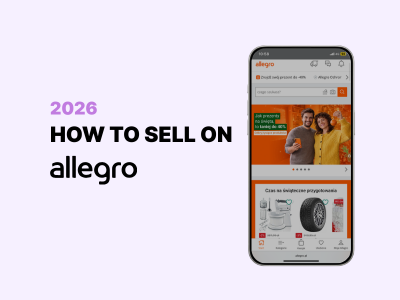OUR COMPANY
Subscribe to newsletter
Thank you!
Oops! Something went wrong while submitting the form.


Expanding your e-commerce business? Selecting the right marketplace integrator is crucial for streamlining operations, automating processes, and ensuring scalability. Whether you’re selling on Amazon, Shopify, eBay, or other platforms, the right integration solution helps synchronize product data, connect multiple sales channels, and enhance operational efficiency. See all our +50 connectors here.
A scalable marketplace integrator should work effortlessly with your current tech stack, including inventory management systems, order management software, and accounting tools. Look for an API-first solution that supports direct integrations with multiple marketplaces, ERP systems, and fulfillment providers to facilitate seamless growth.
Pro tip: Choose an integrator that provides pre-built integrations with leading e-commerce platforms to reduce setup time and complexity.
Keeping product data up to date is essential for avoiding overselling, stock discrepancies, and order delays. Ensure the marketplace integration software provides real-time syncing of:
Product listings
Inventory levels
Order processing
Pricing updates
A real-time marketplace integration reduces errors, improves customer satisfaction, and helps maintain consistent, accurate product data across multiple sales channels.
Automation is key to scaling efficiently. The best marketplace integrators should handle:
Automated product listings – Instantly update product information across all e-commerce marketplaces.
Dynamic pricing adjustments – Optimize pricing strategies based on competition and demand.
Inventory management automation – Prevent overselling and stockouts with smart tracking.
Did you know? Automating these processes can save up to 30% of operational time, reducing manual work and improving efficiency.
Technical issues can arise, so having access to responsive customer support is vital. When evaluating an integration provider, check for:
Support
Personalized onboarding assistance
Comprehensive knowledge base and tutorials
A provider with strong technical support ensures a smoother transition and long-term success.
Handling customer data requires a secure and compliant integration. Choose a provider that follows industry regulations like GDPR, CCPA, and PCI-DSS. Key security features to look for include:
Data encryption
Secure API connections
Access control and authentication measures
A compliant marketplace integration protects customer data and prevents legal risks.
Your e-commerce business will evolve, so your integration solution should grow with it. Ensure the platform supports:
Expansion to new marketplaces and regions
Scaling with increasing order volumes and SKUs
Adding custom workflows as needed
A future-proof marketplace integration allows for sustainable expansion without operational disruptions.
Choosing the right integrator now ensures your business stays competitive.
Selecting the right marketplace integration software enhances efficiency, minimizes errors, and supports long-term growth. By prioritizing seamless integration, real-time syncing, automation, security, and scalability, you can optimize your e-commerce operations.
Looking for a powerful marketplace integrator that meets all these criteria? Sello offers a robust solution to help you expand across multiple marketplaces with ease.
Check out our FAQ to learn how we can help scale your e-commerce business!
Fredric Hedman, Head of Sales & Marketing


